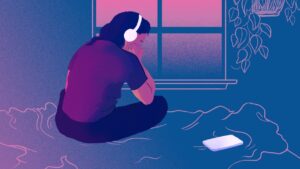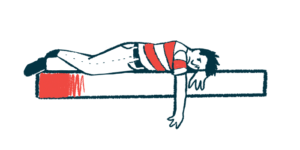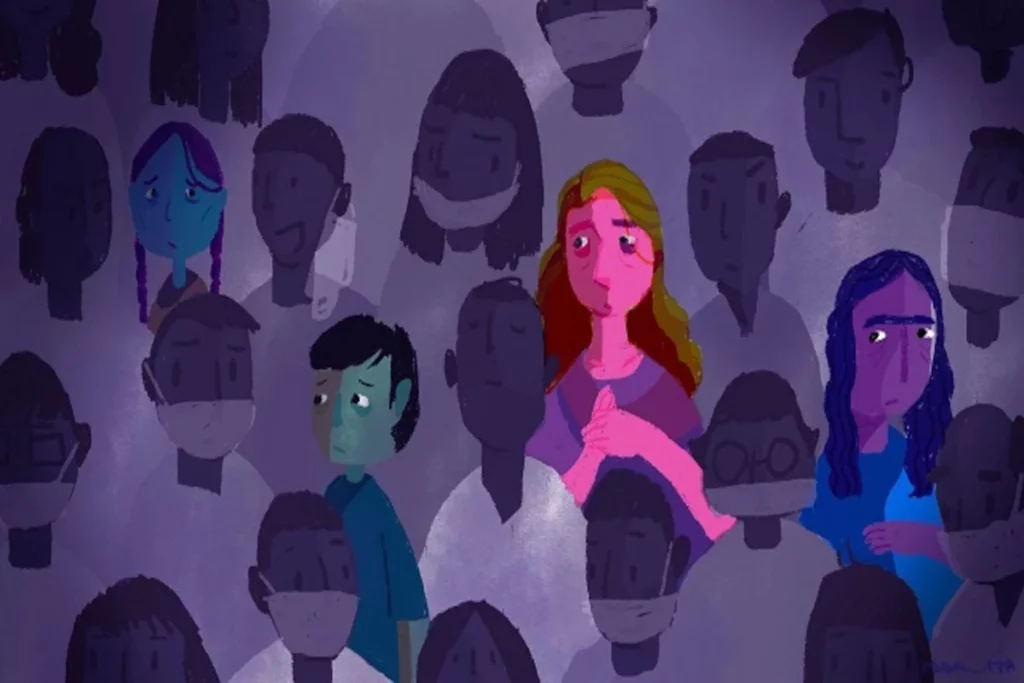Depression is a serious mental illness that can have devastating effects on your life. One of the most dangerous aspects of depression is its ability to cause isolation. When you are feeling depressed, it can be difficult to reach out to others for help. You may feel like you are all alone in the world and that no one understands what you are going through. This can be a very dangerous place to be. In this blog post, we will discuss the dangers of isolation and depression and how you can protect yourself from these feelings.
Contents
Defining Depression

Depression is a mental illness that is characterized by a persistent feeling of sadness, emptiness, or hopelessness. People with depression may also experience a loss of interest in activities that they once enjoyed. Depression can cause a variety of physical and emotional problems. It can make it difficult to concentrate, sleep, eat, or even enjoy life. Depression can be caused by a number of factors, including genetics, brain chemistry, and stressful life events.
It is important to note that depression is not the same as sadness. Everyone feels sad from time to time. Depression is a more serious condition that can have a profound effect on your life. If you are feeling depressed, it is important to reach out for help.
Defining Isolation
Isolation is a rather tricky and ambiguous concept. In its broadest sense, isolation refers to the state of being alone. This can be a physical state, such as being the only person in a room, or an emotional state, such as feeling like you are the only one who understands what you are going through. Isolation can also refer to a social state, such as feeling like you are not part of a group or community.
In its most extreme form, isolation can lead to feelings of loneliness and despair. When combined with depression, isolation can be a very dangerous combination.
Isolation can also be of various types: social, emotional, and physical. Although these types have overlapping features, they also have unique characteristics. And each type of isolation has different effects on mental health.
Link Between Isolation And Depression

The correlation between these two concepts can be rather complicated. In some cases, isolation can lead to depression. feeling isolated from others can make you feel like you are not part of the world around you. This can cause feelings of loneliness and despair.
On the other hand, depression can also lead to isolation. It is important to remember that isolation and depression are two different things. However, they can often go hand-in-hand. Like we also observed above, isolation is of three types: social, emotional, and physical. Let’s take a more detailed look at each one of them:
- Social isolation is when you feel like you are not part of a group or community. This can happen when you move to a new place, start a new job, or have a falling out with friends or family. Social isolation can also happen if you are the only person in your social circle who is going through a particular experience.
- Emotional isolation is when you feel like you are the only one who understands what you are going through. This can happen when you are dealing with a difficult life event, such as the death of a loved one, or when you are struggling with a mental health condition. Emotional isolation can also happen if you feel like you have no one to talk to about your problems.
- Physical isolation is when you are physically alone, such as being the only person in a room. This can happen when you are working from home, living in a remote location, or spending time in an isolated place. Physical isolation can also happen if you are unable to leave your house due to a disability or chronic illness.
All three types of isolation can lead to feelings of loneliness and despair. When combined with depression, isolation can be a very dangerous combination.
This combination can also manifest in different ways. For example, some people may become isolated because they are afraid of being rejected by others. Others may withdraw from social situations because they are too tired or just don’t feel like it. And still, others may become isolated because they cannot cope with the negative emotions associated with depression.
Another way the dangers of this relationship shows is through physical isolation. This can happen when people with depression stop taking care of themselves and their appearance. They may stop showering, brushing their teeth, or even leaving the house. This type of isolation can lead to further decline in mental health and physical well-being.
Warning Signs
The signs and symptoms of depression-related isolation or vice versa can be difficult and sometimes impossible to spot. It is important to be aware of the warning signs so that you can get help if you or someone you know is struggling. Some common warning signs of isolation and depression include:
- Withdrawing from friends and family
- Loss of interest in activities that were once enjoyed
- Sleeping too much or not being able to sleep
- Not wanting to see or talk to people
- Eating too much or not enough
- Feeling like there is no one who understands you
- Neglecting social responsibilities or obligations
- Forcing yourself to isolated because of negative emotions
- Going out and still feeling lonely or exhausted
- Procrastination
- Loss of interest in sex
- Unexplained aches and pains
- Decline in self-care and hygiene
- Struggling to take care of yourself or your appearance
- Lack of energy or motivation
- Feelings of hopelessness or worthlessness
- Thoughts of death or suicide
If you or someone you know is exhibiting these signs, it is important to reach out for help. There are many resources available to people who are struggling with isolation and depression. With the right support, it is possible to overcome these challenges.
Consequences

While depression and isolation definitely have a negative impact on our lives, it can get severely out of hand if not taken seriously. Some of the most common consequences of unchecked depression and isolation include:
Decreased productivity
When one feels a lack of motivation or will, it can lead to a decrease in productivity. This may look like not getting dressed in the morning, skipping class, or not going to work. This may happen due to the belief that there is no point in doing anything.
Loss of interest
It is no secret that hobbies and favorite activities can fall to the wayside when depression or isolation sets in. This may cause a person to feel like they have nothing to live for. One may also start to lose interest in things that they once enjoyed.
Problems with focus and concentration
Depression and isolation can make it difficult to focus on anything. This may lead to problems at work, school, or in personal relationships. One may also have trouble finishing tasks or projects. This behavior can also manifest as forgetfulness or neglect.
Panic attacks
Depression and isolation can cause extreme anxiety. This may lead to panic attacks, which are sudden periods of intense fear or discomfort. These episodes can be incredibly scary and disruptive. Panic attacks can cause a great amount of distress and may even lead to avoidance of certain situations or places. The signs of having these attacks can be both physical as well as emotional.
Withdrawal
One of the most common signs of depression is withdrawing from social activities. This may include events like birthday parties, holidays, and other gatherings. One may also start to avoid places where they would normally be happy to go. Individuals may even try to isolate themselves from friends and family.
Emotional instability
All the difficulties and changes associated with depression and isolation can lead to emotional instability. This may look like outbursts of anger, crying for no reason, or feeling hopeless. These episodes can be very confusing and distressing for both the individual experiencing them as well as those around them. Some of the most common types of emotional outbursts can look like this:
- Sudden anger or irritability
- Crying for no reason
- Reckless behaviors
- Outbursts at minor inconveniences
- Silent treatment for no reason
- Snapping out for no reason
Unhealthy coping mechanisms
Due to the lack of social support and the negative emotions associated with depression and isolation, some people may turn to unhealthy coping mechanisms. This can look like self-harm, drug use, alcohol abuse, or disordered eating. These behaviors can be very dangerous and should be avoided at all costs. These coping mechanisms have their own set of consequences which may include:
- Injury or death
- Addiction
- Legal problems
- Financial problems
- Health problems
Strained relationships
Depression and isolation can lead to the deterioration or loss of important relationships. This may happen because you are too tired or just don’t feel like socializing. It can also happen because you are withdrawing from people and pushing them away. This may cause you to lose your job, your friends, or your family.
You may also find yourself doing things like making excuses, lying, or engaging in other unhealthy coping mechanisms. This is often done in an attempt to avoid social situations or contact with others. These habits can further damage your relationships and lead to isolation.
Physical health problems
It is no secret that our physical and mental health are interconnected. This means that when our mental health is suffering, our physical health often follows suit. Depression and isolation can lead to a decline in physical health. This may look like:
- Weight gain or loss
- Loss of interest in hygiene
- Changes in eating habits
- Libido fluctuations
- Sleeping too much or too little
- Fatigue
- Aches and pains
These physical changes can be very concerning and may lead to additional health problems such as:
- High blood pressure
- Heart disease
- Diabetes
- Obesity
- Digestive problems
- Migraines
This can make it difficult to manage both conditions.
If you are experiencing any of these consequences, it is important to seek help immediately. Depression and isolation can have a profound effect on our lives. It is important to be aware of the warning signs so that we can get help if we or someone we know is struggling. With the right support, it is possible to overcome these challenges.
Ways To Seek Help
In order to minimize the harmful and negative effects of isolation, it is important to seek help as soon as possible. There are many ways to get help if you or someone you know is struggling. Some of the most common include:
Professional Help
Working with a mental health professional is one of the most effective ways to get help for depression and isolation. A therapist can help you identify, acknowledge and equip you with the tools to work through the challenges you are facing. The most common interventions used by therapists include:
Therapy
One of the most effective ways to treat depression and isolation is through therapy. This can be done in both individual and group settings. In therapy, you will learn healthy coping mechanisms, how to communicate effectively, and how to manage your emotions. You will also gain insight into the root causes of your depression and isolation. Some of the most effective and popular types of therapies for isolation and depression include:
- Cognitive Behavioral Therapy
- Dialectical Behavioral Therapy
- Exposure Therapy
- Interpersonal Therapy
- Narrative Therapy
- Expressive Therapy
The most appropriate form of therapy for you will be decided by your therapist.
Support Groups
Another great way to get help for depression and isolation is by joining a support group. These groups provide a safe and supportive environment where you can share your experiences and connect with others who understand what you are going through. Support groups can be very helpful in providing social support and helping you to feel less alone. They often have a mental health professional as moderators, which can further help you in your journey.
Furthermore, many support groups offer online options, which can be very helpful for those who struggle with social situations or live in rural areas.
Hotlines
If you are struggling and need someone to talk to outside of your personal network, there are many hotlines available that can help. These hotlines provide confidential and anonymous support from trained professionals. They can help you with crisis management, emotional support, and referrals to other resources. The efficiency and speed of these services can prove to be very helpful in emergency situations. It is important to note that not all hotlines are free, so be sure to check with the hotline before you call.
Medication
In some cases, medication may be necessary in order to treat depression and isolation. Medication can be used to stabilize moods, improve sleep, and increase energy levels. It is important to to work with a mental health professional to determine if medication is right for you. Some of the most common types of medications used to treat depression and isolation include:
- Selective Serotonin Reuptake Inhibitors (SSRIs)
- Serotonin-Norepinephrine Reuptake Inhibitors (SNRIs)
- Atypical Antidepressants
- Anti-Anxiety Medications
It is important to work with a healthcare provider to manage the efficacy and side effects of medicines on your body.
Self Help Strategies

There are also a variety of things one may adapt to so as to help themselves cope with depression and isolation. Some self-help strategies that may be helpful include:
Make lifestyle changes
The first step to managing depression and isolation is to make some lifestyle changes. This may include eating a healthy diet, getting regular exercise, and getting enough sleep. Additionally, it is important to limit your alcohol intake and avoid drugs.
Adopt a pet
If you can, adopting a pet can be a great way to combat isolation and depression. Pets provide us with companionship, love, and support. They can also help to reduce stress and anxiety levels. Being around animals also promotes positive social interactions and can help to increase your sense of wellbeing.
Volunteer
Another great way to combat isolation and depression is to volunteer. Volunteering gives you a sense of purpose and can help you to feel more connected to your community. It also allows you to interact with other people and make new friends. Additionally, volunteering has been shown to. Not only will you be helping others, but you will also be gaining a sense of purpose.
Develop a hobby
One of the best ways to fight off depression and loneliness is by developing a hobby. Doing things that make you happy can help improve your mood and increase your overall satisfaction with life. Some hobbies that have been shown to be particularly helpful include: painting, gardening, cooking, writing, and photography.
Challenge negative thoughts
Another self-help strategy for managing depression and isolation is to challenge negative thoughts. When you find yourself thinking negatively about yourself or your situation, take a step back and question the thought. Is it really true? What evidence do you have to support it? Once you challenge these negative thoughts, you can start to reframe them in a more positive light.
Spend time in nature
Spending time in nature can be very beneficial for managing depression and isolation. Research has shown that spending time outside can improve mood, reduce stress levels, and boost self-esteem. Additionally, being in nature can help you to appreciate the beauty of life and feel more connected to the world around you.
Find ways to socialize
The biggest step in breaking out of isolation is to find ways to socialize. This may include joining a club, taking a class, or volunteering. Additionally, you can reach out to friends and family members and set up regular coffee dates or game nights. The important thing is to make an effort to connect with others on a regular basis.
Make a plan
If you are struggling with depression and isolation, it is important to make a plan. This may include setting realistic goals, identifying your support system, and making a list of activities that make you happy. Having a plan in place can help to give you a sense of control and provide structure during difficult times.
Maintain a journal
Maintaining a journal is a great way to cope with depression and isolation. Writing down your thoughts and feelings can help you to process them in a healthy way. Additionally, it can be therapeutic to look back on your journal entries and see how far you have come. There are no hard and fast rules when it comes to journaling, so you can write as little or as much as you like.
Practice relaxation and mindfulness
Relaxation techniques, grounding exercises, gratitude and mindfulness are some of the most effective self-care practices for managing depression and isolation. These techniques can help to ease anxiety, improve mood, and promote a sense of calm. Additionally, they can be done anywhere and at any time.
Some ways to practice these concepts are:
- Progressive muscle relaxation
- Deep breathing exercises
- Visualization
- Guided meditation
- Gratitude lists
- Affirmations
- Manifestations
- Mindfulness activities
All of these activities provide different benefits and can be tailored to your specific needs.
Utilize online resources
There are also many great online resources available if you or someone you know is struggling with depression and isolation. These can be a great way to get information and support from the comfort of your own home. Some popular online resources include:
- Blogs
- Podcasts
- Webinars
- Self-Help Books
These help in providing people with a better understanding of the condition and how to manage it.
These are just a few of the many strategies that can be used to cope with depression and isolation. It is important to remember that everyone is different and what works for one person may not work for another. The most important thing is to find what works for you and to keep going even when things get tough. You deserve to live a happy and fulfilling life.
Conclusion
In conclusion of the above, it is evident that depression and isolation are serious issues. It can be tough to cope with, but there are many strategies that can be used to manage the symptoms. If you or someone you know is struggling, please reach out for help. There are many people who care and want to see you succeed. You are not alone in this fight.
For more information, please contact MantraCare. Depression is a mental illness characterized by persistent feelings of sadness, hopelessness, and loss of interest in daily activities. If you have any queries regarding Online Depression Counseling experienced therapists at MantraCare can help: Book a trial Depression Therapy session


